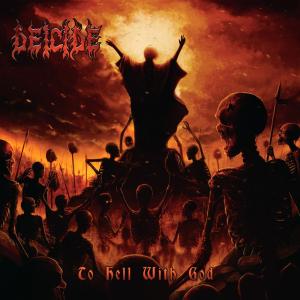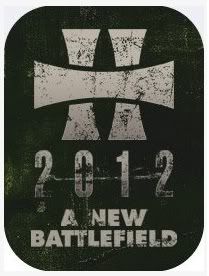Deicide – To Hell With God (2011)
“Save Your” (3:32)
“Witness of Death” (3:05)
“Conviction” (3:15)
“Empowered by Blasphemy” (3:16)
“Angels of Hell” (3:12)
“Hang in Agony Until You’re Dead” (3:59)
“Servant of the Enemy” (3:17)
“Into the Darkness You Go” (3:32)
“How Can You Call Yourself a God” (4:15)
The cover of Decide’s 10th LP speaks volumes, showing an army of the damned surrounding a messianic figure, either in adulation, or preparing to drag him down. This, together with a glance at the track listing, promises a decent album.
The opening track quickly achieves a respectable velocity which, though not maintained throughout the album’s ten tracks, nevertheless characterises the majority of the songs, with the rest settling down to an energetic mid-pace which befits their more atypical riff/rhythm structures, though none of this precludes sharp and abrupt variations in tempo. There is certainly no shortage of fast, blasting passages, and whole songs, but there are also more ‘relaxed’ moments providing lower-tempo hooks, sustained assaults, and moments of introspection. The latter come largely courtesy of the excellent lead work, which is broadly similar to that on the previous 2 releases, and equally comfortable vaulting at light-speed through the higher registers, accompanied by frantic riffing and blastbeats. Fluidity, speed, expertise, and grace are the watchwords here. Others have described the lead style as neo-classical, but I wouldn’t – to me it’s a more fusion-influenced ultra-modern death metal style, at the upper end of the scale of technical proficiency, like a laser-based blowtorch scorching the fretboard and sending coruscating droplets of molten metal in unanticipated directions, and then being jammed into your dazzled eyeball for good measure as you stand entranced.
Musically, the modern incarnation of Deicide has mostly abandoned the main recognisable elements of the band’s original style, but there are moments when the shifting, translucent skin reveals the impression of the ancestral skeleton beneath. Some trace of the classic Deicide sound does remain, in individual riffs and movements – deliberately, if the occasional lyrical references to previous songs and slogans are any indication. And, of course, the vocal style and pattern continues to provide a unifying link with the earlier material, perhaps largely transcending the other stylistic differences.
Lyrically, there are few surprises, and little mention of matters unconnected with Benton’s cosmological preoccupations – thankfully, no songs about divorce are immediately evident. The lyrics revolve around blasphemy and Satan, which are praised, and Jesus, God, and religion, which are not. Again, this can only improve matters in the listener’s estimation. As has been typical of late, the individual songs are more just explorations of this world view in its various aspects than, say, those found on ‘Once Upon The Cross’ (where it is possible to say what each individual song is about). This does not really harm the record, but I can’t help wondering what more the band could achieve with their modern sound if they focused their efforts upon more specific targets. There is less argument for their position and more declaration of it, perhaps, but this is more an observation than a criticism per se.
Vocally, Glen’s customary venomous whiplash delivery is much in evidence, the clarity of his enunciation falling somewhere between their earlier LPs (quite clear) and The Stench Of Redemption’s more deliberate indecipherability. Dual-vocal passages are also frequently employed in the traditional Deicide manner, and the majority of the vocals fall into Benton’s usual characteristic meter and rhyme structure (“Jesus says A, Satan says B, I say a longer bit that ends with C!”), although there are some more unexpected refrains. This seems to be representative of the record in general – it is mostly exactly what you would expect and hope for, but a deeper analysis and further listens will reveal more experimentation and more uncharacteristic riffs and structures than are initially apparent. There are particular individual riffs which one could pick out and say “They’ve never really done a riff like this before” – for example, the opening riff from ‘Empowered By Blasphemy’ is not a ‘typical’ aggressive Deicide riff. The very first riff you hear on the record sets this pattern, staking out a couple of jarring chords on the higher strings before veering into heavier and more familiar territory when the vocals kick in after a couple of bars.
The drumming is excellent throughout, naturally; the faster, sustained relentless beatings are particularly impressive (both in execution and in commitment to brutality) for a band not far short of its 25th anniversary.
Overall, this is a really good LP; like its immediate predecessor, it doesn’t quite measure up to “The Stench…”, but falls short by millimetres rather than whole inches, and constitutes a strong continuation of Deicide’s “return to form”. I would recommend it to anyone who liked either of the previous two releases, whilst for older fans who tuned out somewhere around 2000-ish, I would highly recommend it, firstly as a modern Death Metal LP, and then secondarily as a Deicide LP – the changes in their sound may have curtailed some of the elements for which the original fan base liked them… but on the other hand, I can’t imagine them not liking this anyway on its own merits. It’s heavy as fuck, blasphemous as all unholy hell, and ready to drag you down screaming. If you’ve ever liked Deicide, buy it… and then listen to it.

